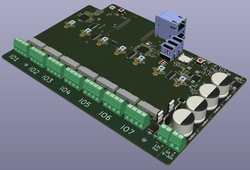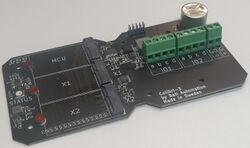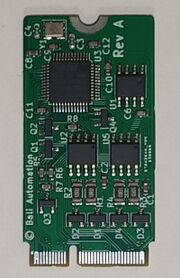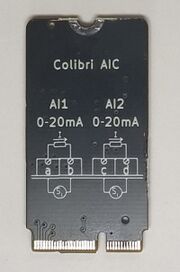Difference between revisions of "Colibri"
| Line 1: | Line 1: | ||
[[Category:Colibri]][[Category:Work in progress]]{{metadesc|Colibri Automation System}} | [[Category:Colibri]][[Category:Work in progress]]{{metadesc|Colibri Automation System}} | ||
| + | |||
[[File:colibri_2-RevA-front3d-2.png|thumb|250px]] | [[File:colibri_2-RevA-front3d-2.png|thumb|250px]] | ||
[[File:Colibri-3-2.jpg|thumb|250px]] | [[File:Colibri-3-2.jpg|thumb|250px]] | ||
Revision as of 13:05, 13 June 2023
Colibri is a low-cost automation system, primarily intended for building automation, home automation, energy supervision, agriculture supervision and similar systems. Main features beside costs are;
- Flexible I/O system, via Expansion Cards in M.2 Key E sockets.
- Power supply of 9-36 Volt, either AC or DC (some expansion cards won't work with DC supply)
- Colibri-1 using LoraWAN for communications.
- Colibri-2 is a full-fledged Raspberry Pi, built with Compute Module 4 (CM4)
MCU Modules
Initially only the Dragino LoRa ST module is available, but other MCU modules are planned for in the near future, especially with more Flash.
Expansion Modules
The Colibri system is based around the M.2 connector and a non-standard bus for I2C and SPI communications. Each expansion board has a EEPROM memory available to identify which module is present in each expansion slot. Furthermore, there is a Colibri Forth program located in the eeprom that contains the functionality of the module, executed in the MCU module. This allows for future expansion modules without requiring the upgrade of the MCU module.
Form Factor
Colibri expansion boards are 22x42mm and has an edge connector called M.2 Key E. Many of the pins are following the Key E standard, but Colibri boards have additional requirements, which is not available in the official standard.
WARNING!!! Do NOT plug Colibri expansion boards into other equipment. Do NOT plug any M.2 card into a Colibri system, unless that card/board is specifically made for Colibri.
Boards
| Name | Type | Description | Status |
|---|---|---|---|
| Colibri-3 | Colibri Carrier | Minimal Colibri Host with 2 expansion cards. MCU slot is to be populated with Dragino LoRaSt module. | Prototype available |
| M2 E Breakout | M2 breakout board | Generic breakout board for M.2 E key boards. | Available for pre-orders |
| Colibri Dev | I/O Expansion | Development, maker, experimentation and breakout board for the Colibri I/O system. Power rails, 24LCxx dedicated footprint, plus i2c and spi on large pads. | Available for pre-orders |
| Colibri AIC | I/O Expansion | Two analog 0-20mA inputs | Prototype available |
| Colibri AIV | I/O Expansion | Two analog 0-10V inputs | Prototype available |
| Colibri AQV | I/O Expansion | Two analog 0-10V outputs | Prototype available |
| Colibri DIU | I/O Expansion | Four digital inputs, for state, counter, pulsewidth measurement. On-board STM32F030 for ability to count very fast pulses and high accuracy PWM measurements. | Prototype available |
| Colibri RS485U | I/O Expansion | Two non-isolated RS-485 ports. On-board STM32F030 implementing Modbus protocol, either as master or slave device. | Prototype available |
| Colibri TRIAC1 | I/O Expansion | Four Triac outputs, driving 24V AC. | Prototype available |
| Colibri MCU1 | Host MCU | Replacement for Dragino LoRa ST as cpu/mcu for the Colibri-3 and similar carrier boards. Contains STM32WL55 with 256kB Flash and 64kB RAM. | Prototype ordered from manufacturer. |
| Colibri PID1 | I/O Expansion | PID regulator, with a PT1000 input and a 0-10V analog output. On-board STM32F030 for host-independent operation. | Prototype ordered from manufacturer. |
| Colibri Pt1000 | I/O Expansion | Two PT1000 temperature sensor inputs. | Prototype ordered from manufacturer. |
| Colibri SSR | I/O Expansion | Two Solid State Relays, ON/OFF. | Prototype ordered from manufacturer. |
Planned Boards
| Name | Type | Description | Status | |
|---|---|---|---|---|
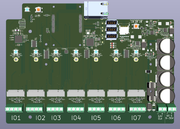
|
Colibri-7pi | Colibri Host | Colibri Host with 7 expansion cards, two Ethernet ports, 4 USB ports and SDcard connector. Powered by Raspberry Pi CM4 module. | Ready for prototype |
Resources
- Dragino LoRa ST software stack; https://github.com/dragino/LoRa_STM32
- Dragino LoRa ST hardware; https://github.com/dragino/Lora/tree/master/LoRaST
